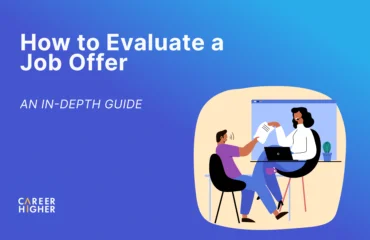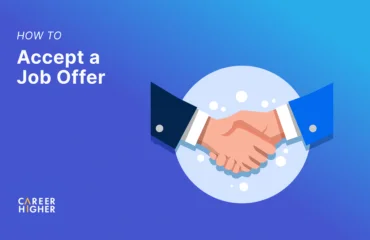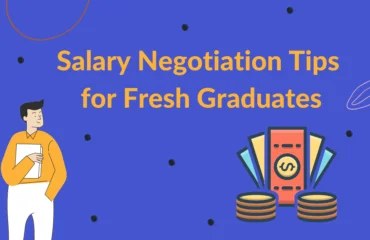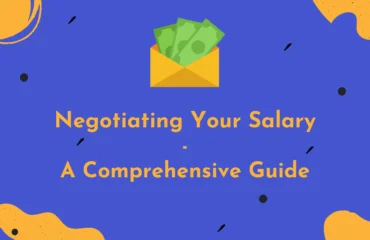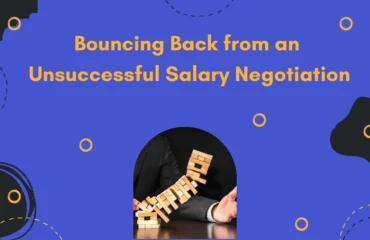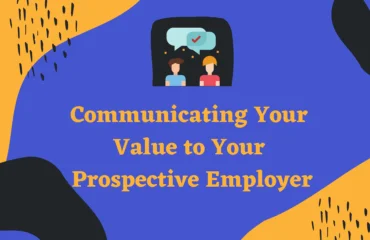Table of Contents
- Why is Salary Negotiation Important?
- How to Use ChatGPT for Market Research in Salary Negotiations
- How to use ChatGPT to Craft a Winning Argument
- How to Use ChatGPT for Role-Playing in Salary Negotiations
- How to Use ChatGPT to Prepare for Challenging Scenarios
- How to Use ChatGPT to Negotiate Perks/Benefits
- Top Tips and Tricks on Using ChatGPT for Salary Negotiation
- Conclusion: Why You Need Expert Help in Salary Talks
In today’s competitive job market, salary negotiation is more than just a conversation about pay, it’s a reflection of one’s value, skills, and contribution to an organization. The ability to effectively negotiate one’s compensation has become a critical skill, regardless of whether you’re a current employee seeking a raise or a job seeker negotiating an initial salary offer. Infact, the top mistake many individuals make is that they rush into negotiations without any preparation.
Interestingly, a study from CareerBuilder found that while 73% of employers are willing to negotiate salary on a job offer, more than half of the workers (55%) don’t even ask. As technology advances, Artificial Intelligence (AI) tools are becoming increasingly relevant in professional scenarios, including salary negotiations. One notable tool is ChatGPT by OpenAI, which can serve as a virtual coach for negotiation discussions. In this blog, we’ll explore how you can leverage ChatGPT to negotiate your salary better with your employer.
Why is Salary Negotiation Important?
Salary negotiation is like setting the price tag for your hard work. It’s not just about the immediate compensation but also the cascading benefits in the future. Consider this: securing a higher initial salary means every subsequent raise, bonus, or promotion compounds on a larger base. Neglecting this negotiation could potentially cost a substantial sum over a career’s span.
Let’s delve into an example to understand this better:
Case Study: Alex and Jamie’s Career Journey
Both Alex and Jamie, newly graduated software developers, were offered a starting salary of $60,000 by different tech giants. Alex, understanding the importance of negotiation, managed to secure a 10% increase, starting at $66,000. Jamie, on the other hand, accepted the initial offer without negotiation.
Over five years, with a consistent annual raise of 5% for both:
- Alex’s salary after 5 years: $84,772
- Jamie’s salary after 5 years: $77,160

The difference from the initial 10% negotiation amounted to $7,658 after five years, not accounting for bonuses or other benefits. From these calculations, we observe that the difference in dollar increment each year is growing, because each 5% increment is calculated on the salary of the previous year. This compounding impact of Alex’s initial negotiation leads to higher salary increments, every year, compared to Jamie’s.
A fair salary can also lead to greater job satisfaction. When you feel adequately compensated, you’re likely to be more engaged and motivated in your role. Thus, mastering your salary negotiation is crucial for both your personal and professional development.
How to Use ChatGPT for Market Research in Salary Negotiations
For Job Seekers: Negotiating Initial Salary Offers
Having the right information is crucial in negotiations. ChatGPT can serve as a useful tool to start your market research. It offers insights into average salaries for specific roles in your industry and location. Here is a prompt you could use:
Help me conduct market research for salary negotiation. I am applying for <insert job role> at <insert company> in <insert city/country>. What is the industry standard for this position?
Here is the job description <insert job posting>
Here is my resume <insert resume>
Here are the results from ChatGPT Plus:
Staying updated on market trends is crucial, even when you’re already employed. If you believe you’re due for a raise, it’s essential to approach the conversation equipped with data that supports your case. Here’s a prompt you could use:
Help me conduct market research for a salary raise. I am currently employed as a [Job Role] at [Current Company] in [City/Country], and I’ve been in this role for [X years/months]. What is the industry standard for someone with my experience and responsibilities?
Here is my job description: <insert job description>
Here are my key experiences <discuss your key achievements, responsibilities and any other relevant information>
Here are the results generated by ChatGPT plus:
The results generated by ChatGPT serve as a good starting point for crafting your negotiation strategy. However, while ChatGPT can provide a range of salary estimates, always cross-reference this with your own research. Platforms like Glassdoor, Payscale, Salary.com, and industry-specific reports can offer more localized and updated data. By combining AI-generated insights with data from these platforms, you can ensure that your salary negotiations are well-grounded.
If you’re a ChatGPTplus user, leverage the ‘Search the Web’ feature. It retrieves real-time data, keeping you informed about the latest salary trends. For those using the ChatGPT 3.5 model, please be aware that your results may not be as up-to-date, as the knowledge cutoff extends only until 2021.
How to use ChatGPT to Craft a Winning Argument
In the world of salary negotiations, the strength of your argument can be the determining factor. With ChatGPT, you have a powerful ally in shaping a compelling case for a salary hike. Here’s a step-by-step guide on how you can leverage ChatGPT for this purpose:
1) Start with Self-Reflection
Before you start preparing your negotiation argument, take a moment to reflect on your journey. List down your key achievements, the responsibilities you’ve shouldered, and the unique value you’ve added or will add to the company.
2) Engage with ChatGPT
With your list in hand, consult ChatGPT to refine and structure these points into a persuasive narrative.
Here’s a prompt to consider:
What’s the best way to showcase my contributions and their impact on the company’s success? Here are my observations <insert your learnings from self-reflection>.
3) Incorporate Performance Metrics
Numbers speak volumes. Whether you’ve surpassed sales goals, improved customer satisfaction levels, or introduced efficiencies, underscore these achievements with tangible figures. Engage with ChatGPT to determine the most impactful way to present these metrics.
Here’s a prompt you could use:
In terms of industry benchmarks, where do my achievements stand? How should I frame these performance metrics to underline my role’s effectiveness? Here are my key achievements: <insert your accomplishments>.
4) Blend in Market Research
Having previously used ChatGPT for market insights, it’s time to weave this data into your argument. This can encompass industry-standard compensation for your role or emerging trends indicating a demand for your skill set.
5) Master Negotiation Techniques
Negotiating is an art. To ensure you’re well-prepared, seek guidance from ChatGPT on best practices and strategies. Prompts to delve into:
What are some proven techniques for salary negotiation? Illustrate with examples.
How can I present my case assertively, ensuring it’s well-received and not perceived as overly aggressive?
6) Tailor Your Argument Based on Your Context
a) For New Salary Negotiations: Focus on the potential value you’ll bring to the company and how your past experiences align with their needs. Draw parallels between the responsibilities listed in the job description and your prior achievements. Demonstrate your understanding of the company’s goals and how you can play a crucial role in achieving them.
Here’s a prompt to consult with ChatGPT:
I am negotiating a salary for a new position, and my experiences align with the job description. How can I communicate this potential value to ensure a competitive salary?” <insert your job description and resume>
b) For Salary Raises: Emphasize your continuous growth, dedication, and value added to the company over time. Showcase your contributions that might have exceeded your initial job responsibilities. Illustrate how your presence and work have positively influenced the team, project, or company as a whole. Highlight instances where you took the initiative, displayed leadership or introduced innovations.
Here’s a prompt to consult with ChatGPT:
I’ve been with my company for [X years/months] and have taken on added responsibilities like [specific examples]. How can I weave these into a compelling narrative for a salary raise? <insert your job description and resume>
7) Personalize Your Argument
While ChatGPT offers a structured foundation, it’s crucial to infuse your personal touch. Highlight any extra initiatives you’ve undertaken, additional certifications you’ve acquired, or consistent commendations you’ve received. Weaving these personal elements into your narrative not only strengthens your argument but also makes it resonate more with your audience.
How to Use ChatGPT for Role-Playing in Salary Negotiations
Role-playing is a powerful tool to prepare for real-life scenarios, and when it comes to salary negotiations, practising your approach can be invaluable. ChatGPT offers a unique platform to simulate these negotiations, allowing you to anticipate potential questions, refine your responses, and build confidence.
If you’re negotiating a salary raise, here’s a prompt you could use:
Conduct a mock salary negotiation session for <insert company name>. Currently, I hold the position of [insert job role] and my earnings are <insert present earnings>.
I’m seeking a pay increase, and in this simulation, you’re the employer. Pose questions to me as you would in a real negotiation. I’ll answer each one. Please proceed with the next question only after I’ve replied.
Here are the results generated by ChatGPT:
For those negotiating a new salary, the context and the kinds of questions you’ll face will differ. It’s essential to be prepared to discuss not only why you deserve the salary you’re asking for but also how your previous experience and skills make you the right fit for the job.
Here’s a prompt tailored for this situation:
Conduct a mock salary negotiation session for a position at <insert company name>. I’m applying for the role of [insert job role] and based on my research and experience, I believe a suitable starting salary would be <insert expected earnings>.
In this simulation, you are the hiring manager or HR representative. Challenge me on my salary expectations and ask questions about my qualifications, experiences, and fit for the role. Let’s go step by step, with me responding to each of your questions or statements.
Here are the results generated by ChatGPT:
As ChatGPT plays the role of the employer, respond to its questions and statements as you would in a real negotiation. This will help you practice articulating your value and handling potential objections. After the simulation, review the conversation, identifying areas where you answered well and areas that need improvement.
The beauty of role-playing with ChatGPT is the ability to run multiple simulations, each time tweaking your approach based on previous feedback. This iterative process will help you build confidence and ensure you’re well-prepared for the real deal.
While ChatGPT can immensely help with your verbal preparation, keep in mind that real-world negotiations go beyond words. Body language, tone of voice, and other non-verbal elements play a pivotal role in the negotiation room. Consider taking professional advice from a negotiation specialist for a well-rounded preparation.
How to Use ChatGPT to Prepare for Challenging Scenarios
During salary negotiations, you would often find yourselves in situations where you need to advocate for yourself. Anticipating possible objections and challenges is a crucial step in preparing for these moments. By being well-prepared, you’re not just putting yourself in a position of strength, but also demonstrating to your employer that you’ve done your homework and are serious about your role and growth in the company.
Every interaction with an employer presents a myriad of possible objections or challenges. These could range from concerns about your qualifications to doubts about the budget for a particular role or project.
Here is a prompt you could use to prepare for such scenarios:
What are common objections employers might have during my salary negotiations, and how can I counter them
Here is my resume <insert resume>
Here is my job profile <insert job description>.
How to Use ChatGPT to Negotiate Perks/Benefits
Navigating the challenges of salary negotiations often requires creativity, especially when there’s a bottleneck in acquiring a direct monetary raise. Sometimes, the constraints are genuine, and it’s up to the employee to explore other benefits or perks that might be equally valuable or even more rewarding in the long run. Thankfully, with tools like ChatGPT, brainstorming for such alternatives becomes a structured process.
When met with a denial for a direct raise, you can pose questions to ChatGPT to help identify benefits that might be pertinent to your role or industry. The AI’s vast database can often pinpoint options you might not have initially considered, giving you a comprehensive list to take to your employer.
Here is a prompt you could use:
In the context of a [specific job description] with [X years of experience] at a [size/type of company], and considering the constraints on a direct monetary raise, what diverse and industry-specific non-monetary benefits and perks can I propose? I’m looking for a detailed list along with brief explanations for each.
Top Tips and Tricks on Using ChatGPT for Salary Negotiation
Navigating salary negotiations with the aid of ChatGPT can be a game-changer. However, to maximize the potential of this AI tool, it’s essential to understand how to communicate effectively with it. Here are some tips and tricks on optimizing your interactions with ChatGPT for salary negotiations:
1) Refine and Personalize ChatGPT’s Suggestions: Every negotiation is unique. While ChatGPT can offer a foundational script, always infuse it with your personal experiences and achievements. Tailoring the AI’s advice to your situation makes your pitch more genuine and compelling.
2) Specificity in Questions: Being specific can yield more targeted advice. Instead of asking, “How do I negotiate salary?”, a question like “What are specific strategies for negotiating a salary in the tech industry?” can provide more nuanced insights tailored to your field.
3) Singularity in Approach: Compound questions can sometimes confuse the AI or dilute the focus of the answer. Instead of asking, “How do I set my bottom line and when do I reveal it?”, break it down. Start with, “How do I determine my bottom line?” followed by, “When’s the best time to disclose my salary expectations?”
4) Use the Right Terminology: While ChatGPT is adept at understanding both layman and expert terms, choosing the right terminology can refine the quality of the response. For instance, instead of “bottom line,” using the term “resistance point” (a more technical term in the negotiation context) might yield a more in-depth discussion on the topic.
5) Consistency in Thread: If you’re diving deep into a topic, maintaining the same thread can be beneficial. Continuous interactions on the same thread allow ChatGPT to provide more contextual and coherent advice. However, for a fresh perspective or a new topic, starting a new thread can be more effective.
6) Seek Feedback Beyond AI: After practicing with ChatGPT, discuss your strategy with mentors or peers. Their human perspective can offer invaluable insights that even the most advanced AI might miss.
While ChatGPT is a powerful tool for salary negotiations, combining its capabilities with effective communication strategies and personal insights ensures a well-rounded and authentic approach to your discussions.
Conclusion: Why You Need Expert Help in Salary Talks
In the landscape of career advancement, AI tools like ChatGPT have emerged as valuable allies. However, like all technology, they have their limitations. While they offer a broad understanding and can simulate various scenarios, they might miss the nuances of real-time market dynamics and the intricacies of human emotions.
The art of negotiation is multifaceted. It encompasses not just the spoken word but also the unspoken cues – the body language, the tone, the pauses, and the emphasis. These subtleties often hold the key to steering a conversation in your favour.
With our Salary Negotiation solution, we provide specialized advice to help you negotiate offers effectively, maximizing your compensation for your target roles. Our experts have crafted a top-tier negotiation process, backed by robust recruitment, coaching, and career consulting skills, to ensure you receive a package that truly reflects your worth. In the end, while AI can serve as a starting point, it’s the human touch, understanding, and expertise that truly make the difference.











